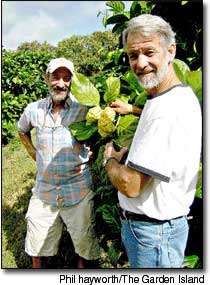For the first part of this year, the 54-year-old Moloa‘a farmer has been on the run hawking his noni “fruitleather” at tradeshows from Hanelei to Tokyo, and Anahiem to Honolulu. Indeed, Frailey will talk noni with just about anyone who
For the first part of this year, the 54-year-old Moloa‘a farmer has been on the run hawking his noni “fruitleather” at tradeshows from Hanelei to Tokyo, and Anahiem to Honolulu.
Indeed, Frailey will talk noni with just about anyone who will listen.
“This stuff’s amazing,” Frailey says. His excitement borders on the frenetic as he recites a long list of the tropical plant’s miraculous properties.
“It helps cure abrasions, aches, allergies, fungus, disgetive disorders, inflammation, ulcers, high-blood pressure, sore throat, tuberculosis, fractures…”
Fractures? Tuberculosis?
Ancient Polynesian knowledge reports this is the case, Frailey insists. A few of the cures have been verified by Western science, but the jury is still out on the some of the more serious cures.
Still, noni, a.k.a. Morinda citrifolia, has a long, anecdotal medical history, Frailey says. He’s only too willing to bend your ear about the whole thing, starting from the time the first Hawaiians brought noni along with them to Hawai‘i.
“They only brought the best stuff,” he says. That means that Hawaii’s noni is better than, say, Tahitian noni, he says.
And that’s a good thing, because “Tahitian Noni” products are hot.
Tahitian Noni drinks can be found on store shelves around the world, and, according to a company website, sales are up $11 million over last year.
Revenue figures weren’t available, but according to their site, Tahitian Noni recently unveiled 10 new products to over 5,000 distributors attending a conference at the Venetian Resort and Casino in Las Vegas.
Frailey dismisses their products as watered down. To enjoy the true health benefits of noni, he says, it must be pure, without fermenting, so that the fruit’s enzymes can work their magic.
“Their stuff is only 10 percent noni,” he said. “Our fruitleather is 100 percent Hawaiian noni. We don’t ferment it as a drink, but dry it so that it can be used as potent tea, or even a bandage.”
Frailey and his partner, long-time North Shore resident Scott “S.H.” Jarvis, have even produced a noni lotion. Combined with lavendar and grapefruit, the lotion is said to have properties so miraculous that local college atheletes are rubbing it into their bruised bodies.
“They’ve had amazing results,” Frailey says. “We’ve heard of one football player who was sidelined with a major shoulder injury. After using the noni lotion, he was out playing the next game.”
The secret to his noni, he says, is in the pulp drying process: indirect heat from steam, not direct heat from propane burners, and never more than a 115 degrees Fahrentheit. The result is a potent fruit “rollup”- like leather.
“That way, we don’t lose many of the enzymes,” he said.
Noni is notoriously unappetizing. So Frailey has compromised, to some degree, by producing a banana-noni leather that’s quite tasty. The fruity combinations are endless, but you can tell from Frailey’s face that he would prefer to stick to conversations about 100 percent noni.
“We’ve gotten the best response from our 100 percent stuff,” he said. “While they like the tasty product, people really appreciate the health benefits of the pure product.”
Frailey and Jarvis spent years and a $100,000 producing their unique, proprietary drying process and facility in Moloa‘a. The result is a small but squeaky clean factory on a hill on Frailey’s 20-acre farm where about eight acres are planted with noni.
“Noni needs sunlight,” says Frailey. The hillside where his noni grows basks in it, producing fat noni that ripens white for five months, then rests a month, then produces another five.
At that rate, Frailey and his teenage son are out picking enough noni all year ‘round to produce 500 32-ounce packages of noni fruitleather annually. And it’s all certified organic, Frailey says, from the drip-irrigated trees to the leather’s biodigradeable cellophane wrapper. They could produce twice the amount, but Frailey figures they’ll need another dryer.
In the meantime, Frailey — who is undoubtably the marketing arm of the two-man operation — says he’s busy just keeping up with local and mainland demand.
“We’re negotiating with Whole Foods in California, and also the Navy Exchanges,” he said. Those two accounts alone could make the team’s noni fruitleather a major player in the market. But Frailey’s non-stop marketing approach has folks in far-flung Japan jumping for his product.
“They’ve got a shopping channel over there and they wanted 500 packages,” he said. “I said, ‘500 per year?’ and they said, ‘No, 500 per day!'”
“That’s everything I make in a year,” Frailey said.
Meanwhile, his partner, “S.H.,” just leans back and smiles.
“I’ve been growing and experimenting with noni fruitleather for years,” he grins, “but I never really made it past Hanalei.”
Instead, Jarvis works in cyberspace, developing the company’s website complete with secure order forms and enough information about noni to keep an ethnobotonist busy for weeks.
“Gosh, we’re going to the senior tradeshow at the Blaisedell next and the arthritis market alone could be huge,” Frailey says.
Big dreams for this one-time California farmer who came to Kaua‘i 30-years ago to live a simple life. But that’s all changed since discovering his miraculous noni.
For more information go to www.nonifruitleather.com


